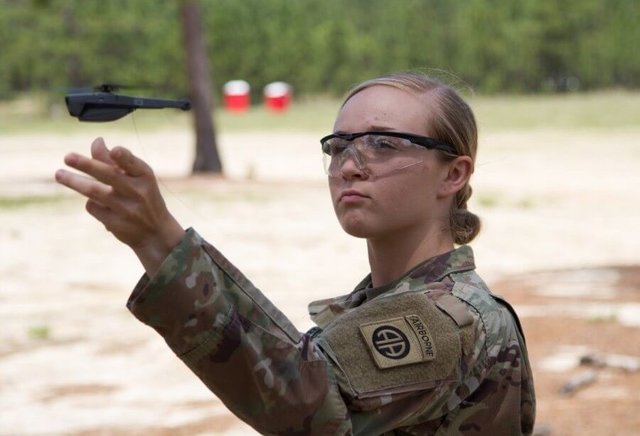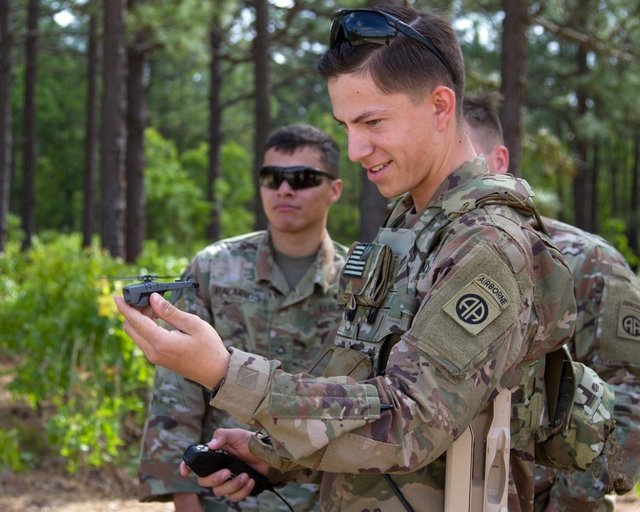U.S Troops To Start Using Mini-Drones For The 1st Time

For the 1st time ever, United States troops will bring into action the pocket size drones at the troop level on their approaching stationing in Afghanistan. The troops with the 82nd Airborne Division will be the 1st infantry Army battalion to employ these pocket-size drones. The troops with the Division’s 3rd Brigade Combat team were allotted Black Hornet Personal Reconnaissance System this spring and provided training on how to operate the drones, which resemble miniature helicopters.
According to a brigade spokesman, the 1st Battalion, 508th Parachute Infantry Regiment will employ the machines next month in Afghanistan, while other factions of the brigade will wait to see the best way to control the system. These devices will provide near real-time video that will enable the soldiers to inspect their surroundings and locate enemies in combat thoroughly. The handy tool is expected to become a standard kit for units across the Army.
“This kind of tech will be a life-saver for us because it takes us out of harm’s way while enhancing the ability to execute whatever combat mission we are on,” said Sgt. Ryan Subers, who was part of the training. “I am very grateful for technology like this and to be a part of the 1st unit to use it.”

Pfc. Kyle Dinsmore, 505th Parachute Infantry Regiment, 1st Battalion, 82nd Airborne Division gets his turn to use the system during the SBS at Fort Bragg, N.C., 2nd May, 2019. Source: Patrick Ferraris - VirtualTechnology
The U.S Army first bought Black Hornets, made by the famous Oregon-based FLIR Systems Inc., for testing with Special Forces units in 2016. The devices are noiseless, featherlight with a flight time of up to 25 minutes, the company’s website said.
The Black Hornet has been labeled the world’s smallest surveillance, intelligence, and reconnaissance Unmanned Aerial Vehicle platform and it introduces a rotor with a diameter of 4.8 inches (123mm) and 6.6 inches (168mm) in length. Altogether, the Black Hornet weighs only 33 grams (1.2 ounces). The mini-drone can be deployed in less than 1 minute and has a range of over a mile (>1.6 km). Its purpose is to reduce battlefield blind spots while trying to save troop’s lives and avoiding collateral damage, according to a company official.
“With this system, you can identify enemies, you can look for IEDs on your route,” informed Kristian Molander, a FLIR operator, and supervisor, in a video interview. “If you are taking fire from areas you can’t see, you can use this drone to identify stuff before you move into the line of enemy fire.”
It generates almost no noise and can operate at wind speeds ranging between 17 mph (27 km/h) to 23 mph (37 km/h) and in temperatures between -10º C (14 F) and 43º C (109 F). This miniature helicopter is suitable for the Afghan weather where the temperatures rise to 122 F (50⁰ C) in southern and eastern areas of the country while in mountainous regions the winter temperatures can drop down to 13 F (-25⁰ C).
It usually takes 20 to 120 seconds to launch the drone depending on the launch mode, and it can operate in several flight modes such as manual, auto, stare, and hover, route lost link and more.
The Black Hornet features 2 electro-optic cameras, and a fused thermal LED light night imager which helps the troops capture both still images as well as live videos. Battery-wise, the drone comes with a replaceable one that can offer up to 25 minutes of flight time and a range of 2 km (1.2 miles).
The drone operates by using the GPS system but can also be upgraded to vision-based navigation for indoor operation. Over and above that, it can deliver an encrypted data link that has a radio range of over 1.2 miles (2 km).
A soldier can learn to fly it in 2 minutes while detailed training with the instructor takes less than 3 days.
To protect the drone against hacking, the wireless commands and data sent between the drone and its controller are encrypted, the Army said in a statement last May in which the service said it had ordered about 60 systems.
Besides a $2.6 million contract awarded to FLIR last spring, the U.S Army granted the company nearly $40 million in January 2019 to provide Black Hornets for the Army’s Soldier Borne Sensor (SBS) program. The deal would give the Army about 9,000 systems, each with 2 drones.
According to FLIR spokesman Joe Ailinger Jr, the fundamental design of a Black Hornet system includes 1 drone for the night and 1 for the day, a display about the size of a tablet computer, and a base station that connects to a handheld controller, but it varies from customer to customer. However, the configuration is flexible and can be modified as needed, Mr. Ailinger added.
The 1st Security Force Assistance Brigade, which was deployed to Afghanistan in 2018, is set to become the 2nd Army unit to be given Black Hornet mini-drones later this year.
Elements of the Fort Bragg, N.C.-based 3rd Brigade, including the drone-equipped battalion, will be stationing to Kandahar in southern Afghanistan very soon (maybe this month), a brigade spokesman informed us. They will replace the 10th Mountain Division, 2nd Brigade Combat Team, out of Fort Drum, N.Y, which deployed to Afghanistan last fall to support the dual U.S. mission — a joint counterterrorism effort with the NATO-led effort and local Afghans to build up and support the Afghan security forces.
Source: https://virtualtechnology.tech/us-army-to-start-using-mini-drones-for-the-first-time/
P.S Please upvote comment and follow me, I follow and upvote back! An RT would be awesome too!!!
Source: U.S Army To Start Using Mini-Drones For The First Time
Noiseless drone? Sounds phantastic
Posted using Partiko Android
Indeed!
and thanks :)
This seems awesome!
It really is
Resteemed by @resteembot! Good Luck!
Check @resteembot's introduction post or the other great posts I already resteemed.